By Sandra Hutchinson, Chronicle Assistant Publisher
Nettle Meadow Farm & Artisan Cheese is now making all its cheeses in Lake Luzerne, at the classic log Hitching Post building that it bought in 2020 and spent two years renovating.
Sheila Flanagan and Lorraine Lambiase have operated Nettle Meadow in Thurman in the mountains of northwest Warren County since 2005, when they quit legal careers in California to buy the then 50-acre farm pursuing their dream to raise goat and sheep and make cheese.

“We definitely had our rose-colored glasses on,” Ms. Flanagan tells The Chronicle.
“Once we got here, and fall and winter happened, we realized how much work the place needed.” She said they had poured their retirement funds into the farm, and taken out a large loan, and “turning back wasn’t an option.”
Nettle Meadow has achieved a national, even international, reputation. Most recently its Kunik was named one of the top 20 cheeses in the world. (See sidebar.)
The women also operate a not-for-profit animal sanctuary, where their retired goats, sheep live out their lives after milk production, with other animal rescues.
In 2020 Nettle Meadow bought the deteriorated Hitching Post building on Route 9N. It turned out to be two weeks before the Covid lockdown was imposed.
“There were so many dark days,” Ms. Flanagan says. She recalls thinking “This is the end. This was the fatal mistake.’”
But two years later she can say, “There’s some ‘meant to be’ in this spot. So many weddings happened here. Everybody has a memory of this place and it’s nice to see it open again. It was definitely on its last leg when we bought it.”
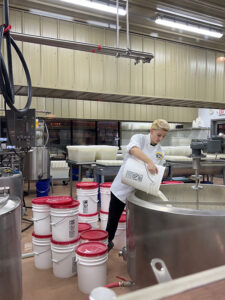
Nettle Meadow carried on through the pandemic, tapping employee retention grants and making cheese nearly every day of the year in Thurman as the rehab of the Hitching Post building proceeded.
Last month, mid-February, all the cheese-making moved here. Ms. Flanagan said it will allow Nettle Meadow to increase production at least fourfold.
There are eight to 10 cheese makers.
The cheesemaking — sheltered but viewable behind glass — is at the back of the building. The massive stone fireplace on the rear wall is unused but was preserved and is visible to visitors.
Up front, they’ve reopened the Hitching Post’s original 1939 bar.
As Nettle Meadow describes it, “The tavern, with its long pine bar and enormous fireplace, offers cheese platters, soups and sandwiches, with the focus being on showcasing the cheeses. Also offered are local and artisan beers, ales and hard ciders. There’s a selection of American wines, as well as Kombucha on tap. Current hours are Thursday and Friday 4-8; Sat. noon-8; Sunday 11-4.”
The potential is clear and enormous.
“We’re trying to cut our teeth right now, get a sense of what works, what doesn’t work, what comes out quickly, what’s the slow one? And what people really enjoy and what’s not a good combination and what’s too complicated for the staff? The staff is learning too, and as they learn out, hopefully, it’ll be manageable for everyone….I’m hoping the timing works out perfectly, where people are just interested in getting jobs again, and there’s enough people to staff the tavern as well as the cheese plant, because right now,the days are too long for all of us.”
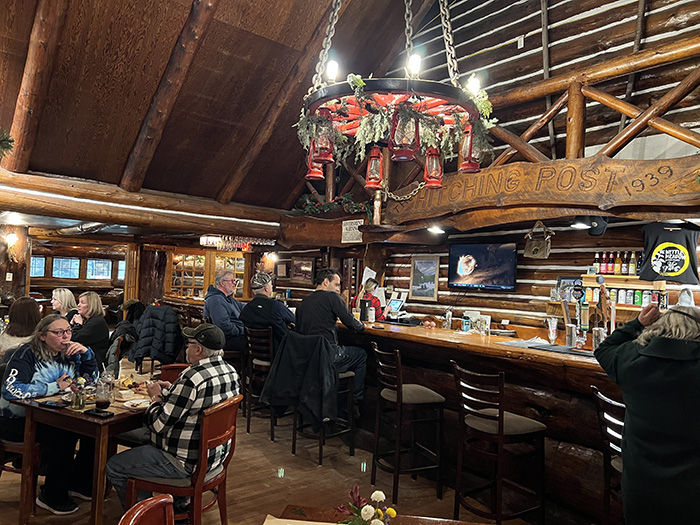
She says of the tavern, “We know it’s going to get busy, and it probably will overflow onto the porch. It could be nice, or it could be overwhelming.”
Asked how many people Nettle Meadow employs, Ms. Flanagan said, “The town supervisor asked me that. I was embarrassed, I don’t know.
“Lorraine keeps track of that. I’m sure she would say close to 35 — between the cheese plant and the farm hands and the drivers on the road, and the servers and the bartenders, the kitchen staff, dishwashers, maintenance crews, managers.”
An extensive retail shop at the front right of the building features Nettle Meadow cheeses plus local maple syrup, honey, more foods and merchandise.
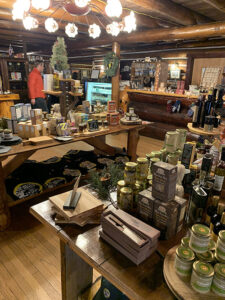
Ms. Flanagan admits they were in over their heads when this whole idea started.
“I started making cheese from Nigerian dwarf goats we had in California and it was really good. We thought we were just so good at making cheese, but we didn’t realize [it was because of] how high the butterfat is of Nigerian dwarf goats.
“And then I just started reading” and learning about cheese-making” — and everything else about business.
Nettle Meadow leases goats & sheep to small farms & buys back their milk
Nettle Meadow used to make its cheese solely from milk produced on its farm in Thurman by its own goats and sheep.
Now they’ve pioneered a system with some small farms in the Amsterdam, N.Y., area in which Nettle Meadow leases out sheep and goats to them and then buys back their milk.
“It was our own model that we created,” Sheila Flanagan told The Chronicle. “We had all these animals and they’re very close to our hearts. They’re like extended family. And as we got older, and the farm got larger,” they asked themselves: “What are we going to do?”
Ms. Flanagan says, “One of my feed salesman said, I know, a whole community of people that just lost their contract [to sell their cow milk]. They don’t know how they’re going to provide for their families. It would be a perfect marriage.
She says those small farms lost their contract “because these large milk companies want farms that have robotic milkers, not families with children who just milk you know, some days.
“And for us, there’s a lot better quality milk for cheesemaking in something that hasn’t been through a million miles of pipeline. And so small families with small production facilities make better quality milk that’s less beaten up.
“And, you know, if there’s a health issue with an animal, someone’s going to notice…
“So you know, this is a perfect match. We started out with, I think five different families — three had goats, one took some of our sheep — we were going to keep half the sheep out. And then we partnered with one gentleman who heard that we were interested for the cows and he’s like ‘you could set up a partnership we can buy the cows together.’
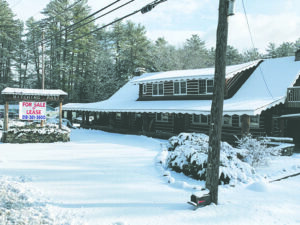
“And so we had these five families and they enjoyed it. They had more people in their community that were looking to do this work. So we leased the rest of the working sheep. And we leased the rest of the working goats to a few more families. So now we’ve got 14 different families that we’re working with.
Ms. Flanagan says that “six days a week” Nettle Meadow staff drive to the farms — “you see the animals” and pick up milk.
“I don’t think there’s any contract in America like it for any other cheese company. And from our standpoint, they’re getting a really good deal because they’re leasing the goats at a very low price.
“They’re getting paid for the milk. And they’re getting the best rate — we pay $5 a gallon for goat [milk], $8 gallon for sheep, and $2.50 a gallon cow.
“Nobody else is really getting those sorts of prices right now, especially over the last two years.
“People were really gouging [farmers] — it was like $3.25 for goat, less than $2 a gallon for a cow. And sheep milk, a lot of people were just being cut off because people didn’t want to make it.”
The Chronicle asked, so you can still make those numbers work from your end?
“Our goal during COVID was just to break even,” said Ms. Flanagan. “Stay open and keep as many people as possible. We were not trying to make any money during that time period. And we did receive keep-your-people-employed grants that the federal government was giving out, we applied for those, and we put all of that money back into milk payments.”
“You find ways in different times to make things work,” Ms. Flanagan said. “And we had made those commitments to all of those families. And so we wanted all of them to be able to come through this just like our cheese makers and our cheese production coming through — it’s kind of the whole system has to work or this system doesn’t work for anyone.”
Interestingly, as the leased goats and sheep produce offspring, those will be owned by the farmers, not Nettle Meadow, Ms. Flanagan said.
“And so they’ll come a time when our girls are ancient and they’re all back at the sanctuary. And all of the goats and sheep [at the farms] are their personal property.
“They can still retire their goats at our sanctuary. There will still be an agreement. We don’t want to be buying milk from people that are sending animals to slaughter.”
The farmers will be free to contract elsewhere, “but hopefully, you know, we’ve built up such a good rapport with them and such positive feelings from things like continuing to buy their milk throughout the entire COVID period, that they’re never going to go try and sell that milk” to Nettle Meadow competitors.
“I mean, can we guarantee that? No, but hopefully by maintaining good personal relationships with all those families” it all works out for everybody. “I try to stay in close personal contact with them and it’s working.”
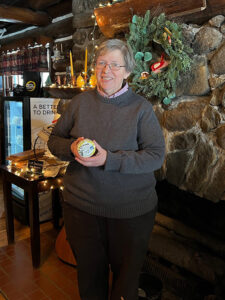
Nettle Meadow Kunik voted one of world’s Top 20 cheeses
Kunik — a cheese that Nettle Meadow makes from goat’s milk and cow cream — was voted “one of the top 20 cheeses in the world” in the 34th biennial World Championship Cheese Contest® in Wisconsin in March 2022.
Nettle Meadow co-owner/cheesemarker Sheila Flanagan told The Chronicle, “I mean, a lot of a lot of old cheese makers would die happy after that. So I’m not too old yet, but, you know, it’s definitely nice.”
She said the competition draws entries and judges from around the world. “It’s like families that have been making cheese from like the 1300s in Switzerland,” she said.
Kunik is a registered trademark of Nettle Meadow for “a unique and voluptuous triple crème cheese…a white mold-ripened wheel made from goat’s milk and Jersey cow cream. The blend makes Kunik far richer and more flavorful than a brie-type cheese yet more subtle and sumptuous than similarly ripened goat cheeses,” says the Nettle Meadow website.
Its press info said the competition “featured 2978 of the best cheeses from around the world, and the overall champion was chosen from a group of 20 cheeses which included Nettle Meadow’s Kunik. The 20 best cheeses included 7 Wisconsin cheeses, 11 European cheeses, 1 California cheese and Kunik from New York State. The overall winner was Gourmino Le Gruyère AOP from Switzerland.”
It said “Nettle Meadow also received best in class wins for Kunik and Truffle Kunik at this championship and a 3rd place finish for their Simply Sheep cheese.”
“This win comes immediately on the heels of Nettle Meadow winning its third Good Food Award for its trademarked Kunik cheese.”
Ms. Flanagan was quoted, “The Good Food Award is one of the most cherished awards among sustainable producers as it looks at the quality of your cheese AND the quality of your care and for the animals who produce the milk that goes into the cheese, the environment we live in and the many amazing craftspeople who put their heart into producing an amazing product like Kunik.”
“We are so elated at the recognition our team has received with this win. We all work so very hard at putting out the best cheese imaginable and this kind of recognition makes all the effort and long days worth it,” Ms. Flanagan.
Their 40+ cheeses
Nettle Meadow produces about 40 different types of cheese, using goat, sheep and cow’s milk, either individually or combined as “mixed milk” cheeses. They make 15 semi-aged bloomy rind cheeses, 5 washed rind cheeses, and about 20 fresh cheeses.
They are known for their mixed milk cheeses, with Kunik being the most well-known type, made from goat milk and cow cream, said Sheila Flanagan.
Within each category there can be many flavors. In chèvre — goat cheese — they offer nine to ten flavors, and are always experimenting.
Nettle Meadow has sanctuary for goats, sheep after milking life ends
Besides owning sheep and goats and using their milk to make cheese, Nettle Meadow operates the not-for-profit Kemp Animal Sanctuary at its original farm in the Town of Thurman./p>
It’s home to approximately 200 goat and sheep, as well as horses, cats, llamas, donkeys, chickens, miniature pigs and even peacocks./p>
These animals are older or “differently abled” sheep and goats from the farm’s production herd, and other animals who simply need a good home, said Sheila Flanagan, who co-owns Nettle Meadow with Lorraine Lambiase.
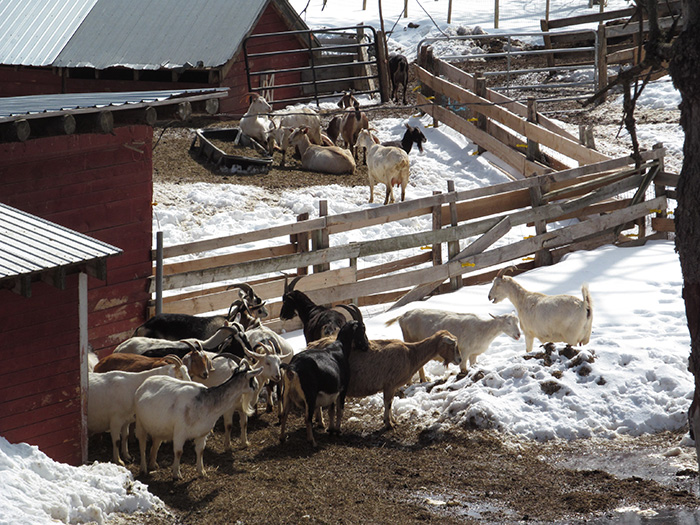
Legal career in Cal.; Sheila is Thurman Town Justice now
Before Sheila Flanagan and Lorraine Lambiase bought Nettle Meadow farm in rural Warren County in 2005, Ms. Flanagan was an attorney in Oakland, California, and Ms. Lambiase was a legal secretary/paralegal.
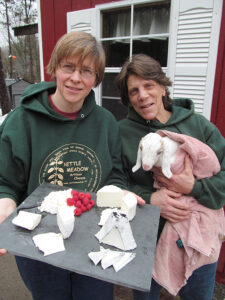
Besides wanting to make the leap into farming and cheese-making, Ms. Flanagan notes that she’s originally from Stamford, Connecticut and Ms. Lambiase is from New Jersey and they wanted to be closer to aging family members.
But having made the move to Thurman, Ms. Flanagan said she realized after just a few months when she “crunched the numbers…Oh my God, this is terrible, financially terrible.”
She said the Oakland law firm still wanted her and offered a partnership. “So I flew to Oakland on Sunday nights. And I flew back here on Friday nights.”
After a few months, she says, she knew it wasn’t tenable, she left the law firm and went totally to Nettle Meadow.
But it wasn’t the end of her involvement in the law. Ms. Flanagan is now the elected Thurman Town Justice.
“I’ve been doing that for almost 10 years now. And it’s the part of law that I actually enjoy, the human interest part. It’s small-time criminal and small claims essentially.”
She quips, “Eventually they’re going to throw me out because you know, find enough sons and daughters mildly guilty and you’re not everybody’s friend.
Copyright © 2022 Lone Oak Publishing Co., Inc. All Rights Reserved
 Glens Falls Chronicle Serving the Glens Falls/Lake George region; Warren, Washington and northern Saratoga counties since 1980
Glens Falls Chronicle Serving the Glens Falls/Lake George region; Warren, Washington and northern Saratoga counties since 1980

